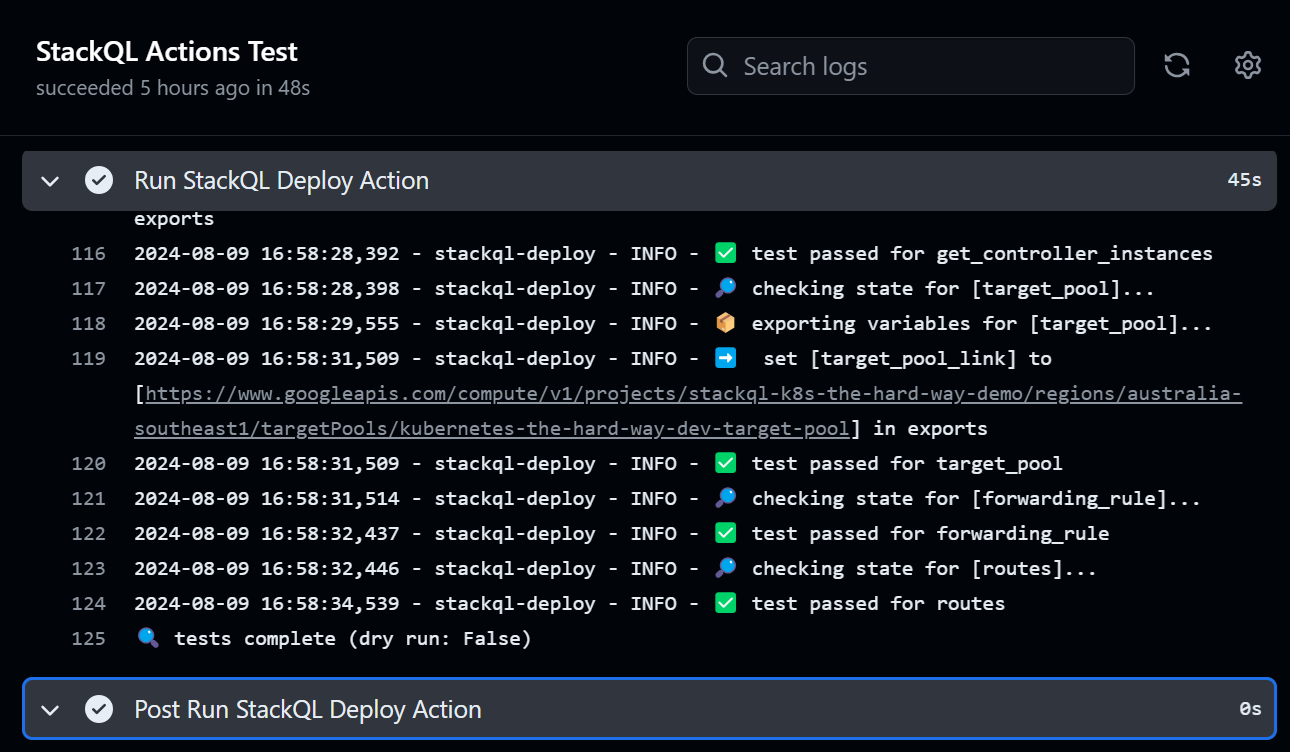from pystackql import StackQL
stackql = StackQL()
stackql.executeStmt("REGISTRY PULL aws")
def ensure_one_or_zero(resource_list, resource_name, region):
if len(resource_list) > 1:
raise RuntimeError(f"ah snap! multiple default {resource_name} resources found in {region}")
elif len(resource_list) == 0:
print(f"/* no default {resource_name} found in {region} */\n")
return False
return True
regions = [
'us-east-1', 'us-east-2', 'us-west-1', 'us-west-2',
'eu-central-1', 'eu-central-2', 'eu-west-1', 'eu-west-2', 'eu-west-3', 'eu-north-1', 'eu-south-1',
'ap-east-1', 'ap-south-1', 'ap-south-2', 'ap-northeast-1', 'ap-northeast-2', 'ap-northeast-3',
'ap-southeast-1', 'ap-southeast-2', 'ap-southeast-3', 'ap-southeast-4', 'af-south-1',
'ca-central-1', 'me-south-1', 'me-central-1', 'sa-east-1'
]
for region in regions:
vpc_ids = stackql.execute(
f"""
SELECT
vpc_id
FROM aws.ec2.vpcs
WHERE region = '{region}'
AND cidr_block = '172.31.0.0/16'
AND JSON_ARRAY_LENGTH(tags) = 0
"""
)
if not ensure_one_or_zero(vpc_ids, 'VPC', region): continue
vpc_id = vpc_ids[0]['vpc_id']
network_interfaces = stackql.execute(
f"""
SELECT
id
FROM aws.ec2.network_interfaces
WHERE region = '{region}'
AND vpc_id = '{vpc_id}'
"""
)
if len(network_interfaces) > 0:
print(f"/* skipping deletion of default VPC ({vpc_id}) in {region} because it is in use */\n")
continue
print(f"/* deleting resources for default VPC ({vpc_id}) in {region} */\n")
route_table_ids = stackql.execute(
f"""
SELECT
route_table_id
FROM aws.ec2.route_tables
WHERE region = '{region}'
AND vpc_id = '{vpc_id}'
"""
)
ensure_one_or_zero(route_table_ids, 'route table', region)
route_table_id = route_table_ids[0]['route_table_id']
inet_gateway_ids = stackql.execute(
f"""
SELECT gateway_id
FROM aws.ec2.routes
WHERE data__Identifier = '{route_table_id}|0.0.0.0/0'
AND region = '{region}'
"""
)
ensure_one_or_zero(inet_gateway_ids, 'internet gateway', region)
inet_gateway_id = inet_gateway_ids[0]['gateway_id']
print(f"/* deleting default VPC routes in route table ({route_table_id}) in {region} */")
print(f"""
DELETE FROM aws.ec2.routes
WHERE data__Identifier = '{route_table_id}|0.0.0.0/0'
AND region = '{region}';
""")
print(f"/* detaching default VPC internet gateway ({inet_gateway_id}) in {region} */")
print(f"""
DELETE FROM aws.ec2.vpc_gateway_attachments
WHERE data__Identifier = 'IGW|{vpc_id}'
AND region = '{region}';
""")
print(f"/* deleting default VPC internet gateway ({inet_gateway_id}) in {region} */")
print(f"""
DELETE FROM aws.ec2.internet_gateways
WHERE data__Identifier = '{inet_gateway_id}'
AND region = '{region}';
""")
nacl_ids = stackql.execute(
f"""
SELECT
id
FROM aws.ec2.network_acls
WHERE vpc_id = '{vpc_id}'
AND region = '{region}'
"""
)
ensure_one_or_zero(nacl_ids, 'network acl', region)
nacl_id = nacl_ids[0]['id']
print(f"/* deleting default VPC NACL ({nacl_id}) in {region} */")
print(f"""
DELETE FROM aws.ec2.network_acls
WHERE data__Identifier = '{nacl_id}'
AND region = '{region}';
""")
subnet_ids = stackql.execute(
f"""
SELECT
subnet_id
FROM aws.ec2.subnets
WHERE vpc_id = '{vpc_id}'
AND region = '{region}'
"""
)
for subnet_id in subnet_ids:
print(f"/* deleting default VPC subnet ({subnet_id['subnet_id']}) in {region} */")
print(f"""
DELETE FROM aws.ec2.subnets
WHERE data__Identifier = '{subnet_id['subnet_id']}'
AND region = '{region}';
""")
print(f"/* deleting default VPC ({vpc_id}) in {region} */")
print(f"""
DELETE FROM aws.ec2.vpcs
WHERE data__Identifier = '{vpc_id}'
AND region = '{region}';
""")
